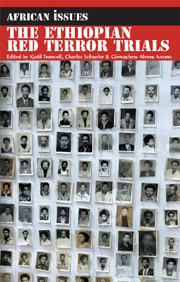Book contents
- Frontmatter
- Contents
- Notes on Contributors
- Preface
- Acknowledgements
- Abbreviations
- Glossary of Amharic Phrases
- 1 The ‘Red Terror’ Trials
- 2 The History of the Red Terror
- 3 The Rights of the Accused
- 4 The Role of the Special Prosecutor's Office
- 5 The Red Terror Trials versus Traditions of Restorative Justice in Ethiopia
- 6 A Quest for Justice or the Construction of Political Legitimacy?
- 7 Building State & Nation
- 8 Beyond the Red Terror Trials
- 9 Concluding the Main Red Terror Trial
- Index
6 - A Quest for Justice or the Construction of Political Legitimacy?
The Political Anatomy of the Red Terror Trials
Published online by Cambridge University Press: 12 September 2012
- Frontmatter
- Contents
- Notes on Contributors
- Preface
- Acknowledgements
- Abbreviations
- Glossary of Amharic Phrases
- 1 The ‘Red Terror’ Trials
- 2 The History of the Red Terror
- 3 The Rights of the Accused
- 4 The Role of the Special Prosecutor's Office
- 5 The Red Terror Trials versus Traditions of Restorative Justice in Ethiopia
- 6 A Quest for Justice or the Construction of Political Legitimacy?
- 7 Building State & Nation
- 8 Beyond the Red Terror Trials
- 9 Concluding the Main Red Terror Trial
- Index
Summary
Introduction
In May 1991 the Ethiopian Peoples' Revolutionary Democratic Front (EPRDF) assumed power in Ethiopia in the wake of a protracted war of resistance where ethnically organized insurgents' movements were pitched against one another in the struggle to defeat the authoritarian and violent central government of the Derg military junta. At that time the Ethiopian people were shattered by the societal consequences of the implementation of rigid, authoritarian ideological doctrines and the wanton disregard of basic human rights. The new revolutionary front which seized power after the collapse of the Derg regime promised substantive changes in that regard, saying that henceforth the central government in the country should be the servant of its people and not its master.
After nearly two decades of internal conflict involving a number of military fronts fighting the central government and each other and massive human rights abuses committed by, but not exclusive to, government, the Ethiopian people held multiple and contradictory perceptions of ‘who was to blame’, as popular memories of an authoritarian past are multi-layered, fluid, indeterminate, fragmentary and contextual (cf Wilson 2001). Thus, an important priority for the new EPRDF-led government was to establish a common and uniform interpretation of the Derg era, by fixing memory and institutionalizing a view of the past conflict.
New regimes will try to re-create the ‘nation’ in their own image in order to give legitimacy to political change by re-inventing history according to their own ideologies (Hobsbawm and Ranger 1992).
- Type
- Chapter
- Information
- The Ethiopian Red Terror TrialsTransitional Justice Challenged, pp. 84 - 97Publisher: Boydell & BrewerPrint publication year: 2009



